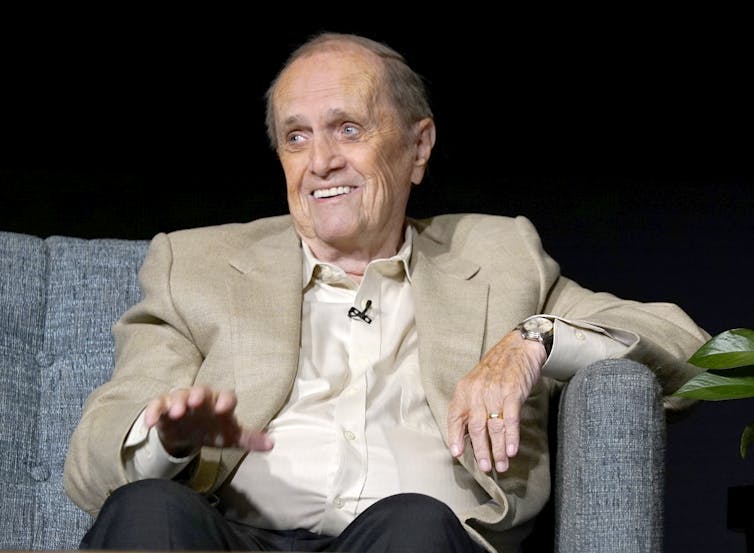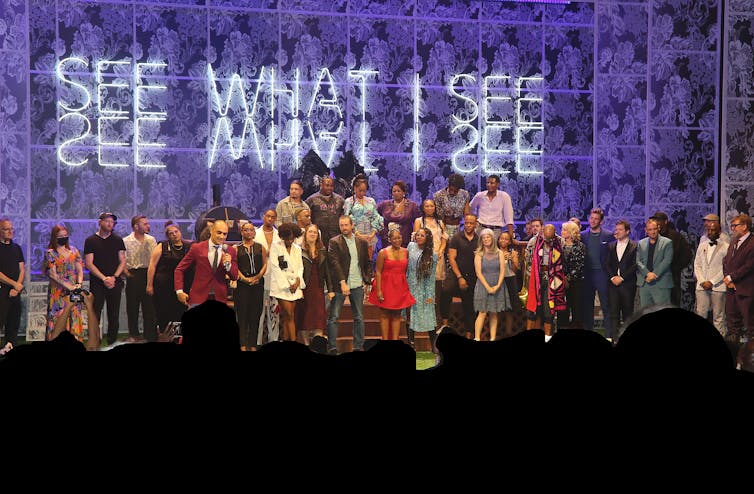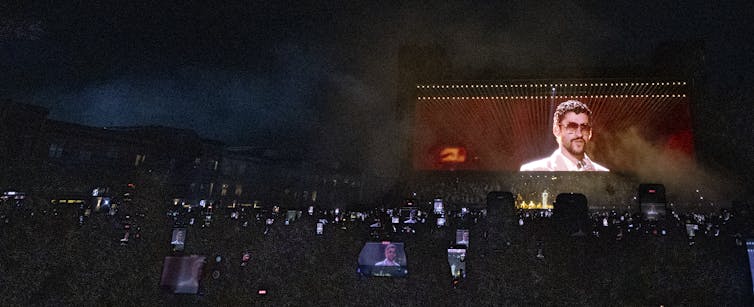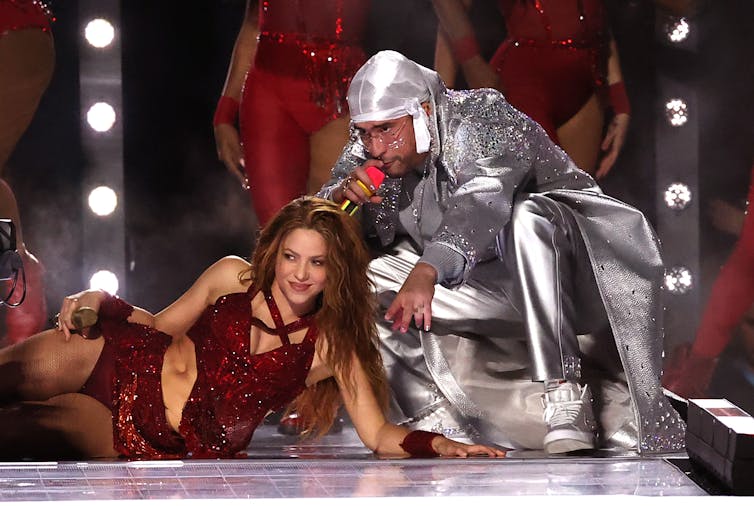Entertainment
Bob Newhart was more than an actor or comedian – he was a literary master
Bob Newhart, initially a stand-up comic, used literary techniques in his routines, earning the Mark Twain Prize. His one-sided conversations engaged and entertained audiences.
Last Updated on September 20, 2024 by Daily News Staff
Mark Canada, Indiana University Kokomo
If you knew Bob Newhart only as an actor – most notably as the star of the legendary “Bob Newhart Show” but also in a minor though memorable role in the movie “Elf” – you may not have thought of him as a literary figure.
However, Newhart, who died on July 18, 2024, at the age of 94, began his rise to stardom as a stand-up comic, crafting and delivering such brilliant monologues as “Driving Instructor” and “Bus Drivers School.” In those bits, he demonstrated a mastery of diction, dialect, character and dialogue worthy of the title “literary master.”
In my view, there is perhaps no more fitting recipient of the Mark Twain Prize than Newhart, who received it in 2002.
As a literary scholar, I typically study traditional poetry and fiction by canonical authors such as Twain and Edgar Allan Poe. But the mastery of language and character is not the sole possession of poets and novelists. Newhart demonstrated that stand-up comedy could also be an art form. https://www.youtube.com/embed/8KSUSk2-JXc?wmode=transparent&start=0 Bob Newhart accepts the Mark Twain Prize in 2002.
‘The old humble bit’
One of his masterpieces is his “Abe Lincoln vs. Madison Avenue” stand-up routine, built around a quirky but timely premise.
Having witnessed the rise of advertising and public relations in the 1950s and 1960s, Newhart imagined a scenario from an earlier age. What if, he asked, there had been no real man with the mind and stature of Abraham Lincoln during America’s Civil War?
The advertising industry, he goes on to say, “would have had to create a Lincoln.” He then performs a one-sided imaginary telephone conversation between a press agent and someone employed to play the part of this manufactured Lincoln – introducing it with a line that would become iconic for Newhart, saying the conversation would have gone “something like this.”
The “something” that ensues is a tightly crafted, six-minute routine worthy of the term “poem.” Indeed, Newhart deployed some of the same literary devices wielded by previous masters such as Twain and Alexander Pope.
Like Twain, Newhart had a marvelous ear for dialect and seasoned his monologue with little bits of slang and jargon to capture the breezy speech of a stereotypical press agent.
“Hi, Abe, sweetheart, how are you, kid?” he begins. “How’s Gettysburg?”
Delivered quickly and offhandedly, the lines, like so much of Newhart’s stand-up work, are subtle, but effective – dead on without being too on the nose. Throughout the bit, he deploys similar little touches of diction – as when the agent refers to “Four score and seven,” the famous first words of the Gettysburg Address, as a “grabber.”
Herein lies another, even more effective, source of humor. Lincoln’s opening is famously lyrical and formal, the epitome of elocutionary eloquence, and the agent has reduced it to a “grabber.” This kind of deflation echoes an old satirical genre known as the “mock-epic.” As practiced by the Enlightment-era English poet, translator and satirist Alexander Pope and others, it draws its humor from the contrast between the sublime and the mundane or even ridiculous.
Newhart returns to the device when he has the agent try to explain to the made-up Abe the logic behind the line “The world will little note, nor long remember.”
Lincoln’s original line is graceful, alliterative and nearly perfectly iambic – an oratory gem if there ever was one – but, for the agent, it’s simply “the old humble bit.” https://www.youtube.com/embed/HTG3glnwoKE?wmode=transparent&start=0 Bob Newhart performs ‘Abe Lincoln vs. Madison Avenue.’
Character is key
Master writers of humor or, for that matter, fiction in general, will tell you that character is key. Get the characters right, and humor – or drama – will follow.
With more of his delightfully subtle touches, Newhart paints a hilarious picture of the naive bumbler the agency has to craft into a Lincoln. Again, as is often the case with humor, irony helps to achieve the desired effect – in this case, humor.
Lincoln was an eloquent, noble figure. He was larger than life – and certainly larger than this dimwit, who doesn’t even get the joke when one of the agency’s “gag writers” supposedly dashes off a line on Gen. Ulysses S. Grant.
The agent shares it with the fake Abe, saying, “They got a beautiful squelch on Grant. The next time they bug ya about Grant’s drinkin’ … you tell ’em you’re gonna find out what brand he drinks and send a case of it to all your other generals.”
After a short pause, the agent says, with Newhart’s famous stammer, “Uh, no, no, it’s, it’s like, like the brand, uh, was the reason he won.” Finally, after another short pause, the exasperated agent snaps, “… use it, it’s funny.” https://www.youtube.com/embed/XaUYQZR-y7I?wmode=transparent&start=0 Bob Newhart performs ‘Driving Instructor.’
Give the audience credit
This last “exchange” demonstrates the most ingenious aspect of Newhart’s humor: his signature one-sided conversation, which he also used to hilarious effect in “Driving Instructor” and other routines.
Now you know why the opening sequence of “The Bob Newhart Show” has Newhart answering a phone – an homage to his then-famous stand-up gag.
We never hear the voice of “Abe” but rather hear only the agent’s side of the conversation. It might seem like a minor detail, but this artifice means that we as the audience have to play an active role in the comedy. We hear the agent’s side and have to imagine what he is hearing. Sometimes the agent repeats what he supposedly hears, but, in this instance, when the agent is trying to explain the punchline of the Grant joke, the burden is on us.
Here again Newhart was employing an old device. In a dramatic monologue such as Robert Browning’s serious poem “My Last Duchess,” the poet leaves out key details, forcing us to detect them and complete the only partially told story.
The device is especially effective in comedy because, as Newhart knew on some level, we all like to feel smart. By putting us in the position of filling in the blanks in the conversation, Newhart gives us the opportunity to feel a little extra satisfaction and to create some of the humor ourselves by crafting our own sense of the rube on the other side of the conversation.
It was the master stroke for a master craftsman. With this brilliant touch, Newhart turned us all into comedians.
Mark Canada, Chancellor and Professor of English, Indiana University Kokomo, Indiana University Kokomo
This article is republished from The Conversation under a Creative Commons license. Read the original article.
Looking for an entertainment experience that transcends the ordinary? Look no further than STM Daily News Blog’s vibrant Entertainment section. Immerse yourself in the captivating world of indie films, streaming and podcasts, movie reviews, music, expos, venues, and theme and amusement parks. Discover hidden cinematic gems, binge-worthy series and addictive podcasts, gain insights into the latest releases with our movie reviews, explore the latest trends in music, dive into the vibrant atmosphere of expos, and embark on thrilling adventures in breathtaking venues and theme parks. Join us at Looking for an entertainment experience that transcends the ordinary? Look no further than STM Daily News Blog’s vibrant Entertainment section. Immerse yourself in the captivating world of indie films, streaming and podcasts, movie reviews, music, expos, venues, and theme and amusement parks. Discover hidden cinematic gems, binge-worthy series and addictive podcasts, gain insights into the latest releases with our movie reviews, explore the latest trends in music, dive into the vibrant atmosphere of expos, and embark on thrilling adventures in breathtaking venues and theme parks. Join us at our Entertainment Section and let your entertainment journey begin! https://stmdailynews.com/category/entertainment/
Discover more from Daily News
Subscribe to get the latest posts sent to your email.
Entertainment
Philly theaters unite to stage 3 plays by Pulitzer-winning playwright James Ijames
James Ijames, 2022 Pulitzer Prize winner for “Fat Ham,” is celebrated with a Citywide Pass in Philadelphia, offering access to three of his plays across different theaters. This initiative fosters collaboration among local theaters and showcases Ijames’ unique ability to create nuanced, character-driven narratives that explore complex queer and Black identities.

Bess Rowen, Villanova University
Most theater subscriptions offer a patron access to a single theater’s season. But Philadelphia’s new Citywide James Ijames Pass provides tickets to three James Ijames – pronounced EYE-ms, rhymes with “chimes” – plays at three theaters in Philadelphia. Subscribers will also get one mustard-colored beanie, one of Ijames’ signature accessories.
The full pass, which costs US$130, includes tickets for the Arden Theatre’s “Good Bones,” which premiered Jan. 22 and runs through March 22, the Wilma Theater’s “The Most Spectacularly Lamentable Trial of Miz Martha Washington,” which runs March 17 to April 5, and the Philadelphia Theatre Company’s “Wilderness Generation,” a world premiere that runs April 10 to May 3. There is also a two-show pass for $90 without “Good Bones.”
I’m a theater theorist, historian and practitioner who has written about Ijames’ work before and after his 2022 Pulitzer Prize. I believe this landmark collaboration between three important Philadelphia theaters is a fitting celebration of a multi-hyphenate theater artist who continues to champion his longtime artistic home.
Actor, playwright, director
Ijames, 46, was born in North Carolina and attended Morehouse College in Atlanta, Georgia. He earned his Master of Fine Arts degree at Temple University and stayed in Philadelphia after graduating.
Notably, this playwright’s MFA is in the study of acting. Ijames is also a talented director, and he performed and directed at multiple theaters around Philadelphia before starting to work as a playwright. He was also a tenured professor of theater at Villanova University, where I had the privilege to work with him and watch his creative process before he moved to New York City in 2025 to run the playwriting concentration at Columbia University.
Ijames was already a local celebrity in Philly before winning the Pulitzer Prize for drama for “Fat Ham,” his Hamlet adaptation centered on a queer Black Hamlet named Juicy and the legacy of his father’s barbecue joint. The New York theater scene took notice of him when the National Black Theatre staged “Kill Move Paradise” in 2017. This haunting piece is set in limbo, where unarmed Black men who have been killed by police examine how they have come to this place and how society continues to enable this pattern.
Other Ijames plays include “White,” a satire of the art world that tells the story of a gay white male artist who hires a Black woman actor to pretend to have done his work to see if that makes a difference in how his art is viewed. “TJ Loves Sally 4Ever” sets Thomas Jefferson and Sally Hemings’ relationship on a college campus where “TJ” is a dean and Sally is a student. And “Reverie” is a chamber play, which is an intimate meditation with an earnest and somber tone. In it, the father of a recently deceased Black gay man comes to meet the man he believed was his son’s partner.
Most recently, in 2025, Ijames partnered with the Australian pop singer Sia on a musical called “Saturday Church.” It is a story about reconciling queer community and Christian faith, and relying on the support of family, both biological and chosen.
Charting new dramatic territory
Although his theatrical styles and genres vary, at his core, Ijames writes nuanced, character-driven works that revolve around interpersonal relationships. His plays are playgrounds for performers, particularly due to his ability to write complex queer Black characters.
Influential American playwright Suzan-Lori Parks notes in her 1994 essay “Elements of Style” that the conflict between Black people and white people is the default trope of how Black people have been represented onstage – by almost exclusively white playwrights – for most of U.S. theater history. Parks posits that a way to avoid this centering of white conflict in Black lives comes from new dramatic territory that depicts conflicts between Black people and anything else.
Ijames never sets his Black characters in opposition to white society alone. He also refuses to take up the tropes of LGBTQ identity as incompatible with religion, or the idea that characters can be only gay or straight. Instead, Ijames creates narratives with queer religious people and pansexual men whose identities are not sources of conflict.
The citywide pass
The plays in the citywide pass offer an exciting cross section of what makes Ijames’s work so vibrant.
“Good Bones” is the story of a now-affluent Black woman, Aisha, who moves back to her blue-collar hometown. Aisha might be from this working-class neighborhood, but her elaborate renovations and white-collar sensibilities make her return seem more like gentrification than homecoming, at least as far as her local contractor can see.
“Miz Martha” follows the titular Martha Washington through a fever-dream-inspired trial in her final moments, as enslaved people care for her while knowing her death means their freedom.
And “Wilderness Generation” follows five cousins reunited in the U.S. South after many years apart, ready to talk about the secrets from their pasts.
With theater’s ever-changing and unstable financial landscape, I believe the Citywide James Ijames Pass is an exciting new subscriber model. The collaboration highlights Philadelphia’s theatrical talent and banks on local theaters working together to build audiences instead of treating each other as competition – a new development that could change how regional theater scenes operate.
Bess Rowen, Assistant Professor of Theatre, Villanova University
This article is republished from The Conversation under a Creative Commons license. Read the original article.
Looking for an entertainment experience that transcends the ordinary? Look no further than STM Daily News Blog’s vibrant Entertainment section. Immerse yourself in the captivating world of indie films, streaming and podcasts, movie reviews, music, expos, venues, and theme and amusement parks. Discover hidden cinematic gems, binge-worthy series and addictive podcasts, gain insights into the latest releases with our movie reviews, explore the latest trends in music, dive into the vibrant atmosphere of expos, and embark on thrilling adventures in breathtaking venues and theme parks. Join us at STM Entertainment and let your entertainment journey begin! https://stmdailynews.com/category/entertainment/
and let your entertainment journey begin!
Discover more from Daily News
Subscribe to get the latest posts sent to your email.
family fun
Jurassic Quest Brings Life-Size Dinosaurs to Phoenix in February 2026
Jurassic Quest is roaring back into Phoenix in February 2026 with towering life-size dinosaurs, interactive exhibits, and hands-on activities for kids and families at the Arizona State Fairgrounds.
Last Updated on February 9, 2026 by Daily News Staff

Phoenix, AZ — Jurassic Quest, billed as North America’s largest traveling dinosaur experience, is set to return to Arizona with a limited engagement at the Arizona State Fairgrounds from February 6–8, 2026.
The family-friendly attraction features life-size animatronic dinosaurs, immersive walk-through exhibits, and hands-on activities designed to blend entertainment with education. Guests will encounter towering recreations of iconic species such as Tyrannosaurus rex and Spinosaurus, along with interactive fossil digs, dinosaur rides, inflatables, and meet-and-greet opportunities with baby dinosaurs.
Jurassic Quest has become a popular touring event across the United States, particularly among families with young children. The experience combines museum-style displays with high-energy attractions, allowing visitors to explore at their own pace. Most attendees spend one to two hours navigating the exhibit.
The event will take place at the Arizona State Fairgrounds, located at 1826 W. McDowell Road in Phoenix, with multiple daily sessions scheduled throughout the weekend.
Tickets and additional event details are available through the official Jurassic Quest website.
- Jurassic Quest Phoenix 2026 – Official Event Page
- Arizona State Fairgrounds – Venue Information
- More Entertainment News from STM Daily News
- Family & Kid-Friendly Events on STM Daily News
Discover more from Daily News
Subscribe to get the latest posts sent to your email.
Daily News
Bad Bunny’s Super Bowl Halftime Show Fits the NFL’s Long Game to Win Latin America
The NFL aims to expand its reach into Latin America through strategic marketing and high-profile performers like Bad Bunny at the Super Bowl halftime show. While the choice has sparked controversy, particularly among conservatives, the league sees it as a business move to attract more fans, particularly in Mexico and Brazil.
Last Updated on February 7, 2026 by Daily News Staff
Jared Bahir Browsh, University of Colorado Boulder
Bad Bunny’s Super Bowl show is part of long play drawn up by NFL to score with Latin America
Donald Trump, it is fair to assume, will be switching channels during this year’s Super Bowl halftime show.
The U.S. president has already said that he won’t be attending Super Bowl LX in person, suggesting that the venue, Levi’s Stadium in Santa Clara, California, was “just too far away.” But the choice of celebrity entertainment planned for the main break – Puerto Rican reggaeton star Bad Bunny and recently announced pregame addition Green Day – didn’t appeal. “I’m anti-them. I think it’s a terrible choice. All it does is sow hatred. Terrible,” Trump told the New York Post.
National Football League Commissioner Roger Goodell likely didn’t have the sensibilities of the U.S. president in mind when the choice of Bad Bunny was made.
One of the top artists in the world, Bad Bunny performs primarily in Spanish and has been critical of immigration enforcement, which factored into the backlash in some conservative circles to the choice. Bad Bunny’s anti-ICE comments at this year’s Grammy Awards will have only stoked the ire of some conservatives.
But for the NFL hierarchy, this was likely a business decision, not a political one. The league has its eyes on expansion into Latin America; Bad Bunny, they hope, will be a ratings-winning means to an end. It has made such bets in the past. In 2020, Shakira and Jennifer Lopez were chosen to perform, with Bad Bunny making an appearance. The choice then, too, was seen as controversial.
Raising the flag overseas
As a teacher and scholar of critical sports studies, I study the global growth of U.S.-based sports leagues overseas.
Some, like the National Basketball Association, are at an advantage. The sport is played around the globe and has large support bases in Asia – notably in the Philippines and China – as well as in Europe, Australia and Canada.
The NFL, by contrast, is largely entering markets that have comparatively little knowledge and experience with football and its players.
The league has opted for a multiprong approach to attracting international fans, including lobbying to get flag football into the 2028 Olympics in Los Angeles.
Playing the field
When it comes to the traditional tackle game, the NFL has held global aspirations for over three-quarters of a century. Between 1950-1961, before they merged, the NFL and American Football League played seven games against teams in Canada’s CFL to strengthen the relationship between the two nations’ leagues.
Developing a fan base south of the border has long been part of the plan.
The first international exhibition game between two NFL teams was supposed to take place in Mexico City in 1968. But Mexican protest over the economy and cost of staging the Olympics that year led the game, between the Detroit Lions and Philadelphia Eagles, to be canceled.
Instead, it was Montreal that staged the first international exhibition match the following year.
In 1986, the NFL added an annual international preseason game, the “American Bowl,” to reach international fans, including several games in Mexico City and one in Monterrey.
But the more concerted effort was to grow football in the potentially lucrative, and familiar, European market.
After several attempts by the NFL and other entities in the 1970s and ’80s to establish an international football league, the NFL-backed World League of Football launched in 1991. Featuring six teams from the United States, one from Canada and three from Europe, the spring league lost money but provided evidence that there was a market for American football in Europe, leading to the establishment of NFL Europe.
But NFL bosses have long had wider ambitions. The league staged 13 games in Tokyo, beginning in 1976, and planned exhibitions for 2007 and 2009 in China that were ultimately canceled. These attempts did not have the same success as in Europe.
Beyond exhibitions
The NFL’s outreach in Latin America has been decades in the making. After six exhibition matches in Mexico between 1978 and 2001, the NFL chose Mexico City as the venue of its first regular season game outside the United States.
In 2005, it pitted the Arizona Cardinals against the San Francisco 49ers at Estadio Azteca in Mexico City. Marketed as “Fútbol Americano,” it drew the largest attendance in NFL history, with over 103,000 spectators.
The following year, Goodell was named commissioner and announced that the NFL would focus future international efforts on regular-season games.
The U.K. was a safe bet due to the established stadium infrastructure and the country’s small but passionate fan base. The NFL International Series was played exclusively in London between 2007 and 2016.
But in 2016, the NFL finally returned to Mexico City, staging a regular-season game between the Oakland – now Las Vegas – Raiders and Houston Texans.
And after the completion of upgrades to Latin America’s largest stadium, Estadio Azteca, the NFL will return to Mexico City in 2026, along with games in Munich, Berlin and London. Future plans include expanding the series to include Sydney, Australia, and Rio de Janeiro, Brazil, in 2026.
The International Player Pathway program also offers players from outside the United States an opportunity to train and earn a roster spot on an NFL team. The hope is that future Latin American players could help expand the sport in their home countries, similar to how Yao Ming expanded the NBA fan base in China after joining the Houston Rockets, and Shohei Ohtani did the same for baseball in Japan while playing in Los Angeles.
Heading south of the border
The NFL’s strategy has gained the league a foothold in Latin America.
Mexico and Brazil have become the two largest international markets for the NFL, with nearly 40 million fans in each of the nations.
Although this represents a fraction of the overall sports fans in each nation, the raw numbers match the overall Latino fan base in the United States. In recent years the NFL has celebrated Latino Heritage Month through its Por La Cultura campaign, highlighting Latino players past and present.
Latin America also offers practical advantages. Mexico has long had access to NFL games as the southern neighbor to the United States, with the Dallas Cowboys among the most popular teams in Mexico.
For broadcasters, Central and South America offer less disruption in regards to time zones. Games in Europe start as early as 6:30 a.m. for West Coast fans, whereas Mexico City follows Central time, and Brasilia time is only one to two hours ahead of Eastern time.
The NFL’s expansion plans are not without criticism. Domestically, fans have complained that teams playing outside the U.S. borders means one less home game for season-ticket holders. And some teams have embraced international games more than others.
Another criticism is the league, which has reported revenues of over US$23 billion during the 2024-25 season – nearly double any other U.S.-based league – is using its resources to displace local sports. There are also those who see expansion of the league as a form of cultural imperialism. These criticisms often intersect with long-held ideas around the league promoting militarism, nationalism and American exceptionalism.
Bad Bunny: No Hail Mary attempt
For sure, the choice of Bad Bunny as the halftime pick is controversial, given the current political climate around immigration. The artist removed tour dates on the U.S. mainland in 2025 due to concerns about ICE targeting fans at his concerts, a concern reinforced by threats from the Department of Homeland Security that they would do just that at the Super Bowl.
But in sticking with Bad Bunny, the NFL is showing it is willing to face down a section of its traditional support and bet instead on Latin American fans not just tuning in for the halftime show but for the whole game – and falling in love with football, too.
Jared Bahir Browsh, Assistant Teaching Professor of Critical Sports Studies, University of Colorado Boulder
This article is republished from The Conversation under a Creative Commons license. Read the original article.
Discover more from Daily News
Subscribe to get the latest posts sent to your email.
